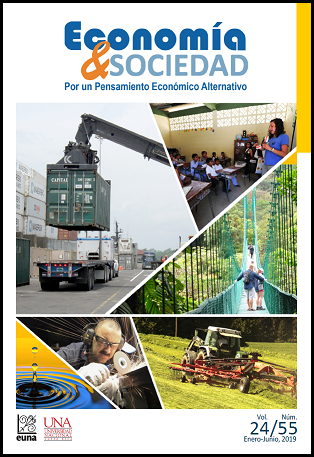Institutions and fetishes: the "dark matter" problem in social sciences
DOI:
https://doi.org/10.15359/eys.24-55.2Keywords:
institutionalization, human relations, fetishes, dark matter, freedomAbstract
The field of social sciences that studies concepts associated with collective entities, that is the theory of fetishism, has faced the problem of the visibility of the invisible since the beginning. It may include partial collectives (companies, schools, armies) or general collectives, such as the social division of labor, market, and State. It is a world of ghostly subjects that have the possibility to dominate us and that ultimately, and to a great extent, end up doing so. Given the growing role of institutions from the dawn of civilization to the present day regarding the pronounced reduction of direct human relationships in modern societies, if we do not grasp and understand the meaning of these fetishes, we will understand very little of the social universe and its fetishization. This is the reason why we state that these fetishes in social sciences are the equivalent of "dark matter" in astrophysics.
References
Baker, J. (2009). 50 cosas que hay que saber sobre física. Ariel. Recuperado de www.librosmaravillosos.com
Hararri, Y. N. (2018). De animales a dioses. Breve historia de la humanidad. México: Penguin Random House Grupo Editorial.
Hinkelammert, F. (1981). Las armas ideológicas de la muerte (2da edición revisada y ampliada). San José, Costa Rica: DEI.
Hinkelammert, F. (2002). Crítica de la razón utópica (Edición ampliada y aumentada). Bilbao: Editorial Desclée.
Hinkelammert, F. (2012). Raíces del pensamiento crítico. Universidad Distrital Francisco José de Caldas, Colombia.
Hinkelammert, F. y Mora, J. (2013). Sobre el desdoblamiento del mundo en las ciencias sociales. Revista Paquidermo. Recuperada de https://revistapaquidermo.com/archives/7730
Hinkelammert, F. y Mora, J. (2014). Economía, vida humana y bien común. San José, Costa Rica: Editorial Arlekín.
Downloads
Published
How to Cite
Issue
Section
License
This publication is subject to the Creative Commons License; therefore, its attributions and restrictions must be respected.
Authors publishing in this Journal accept the following conditions:
- Authors retain copyright ownership and give the Journal first publication right of the paper, which is registered with the Creative Commons Attribution-NonCommercial-ShareAlike 4.0 International License. This license allows third parties to use the published work provided it is sourced as firstly published in this Journal.
- Authors may enter into other independent and additional contractual agreements for the non-exclusive distribution of the article published in this Journal (e.g., to be included in an institutional repository or published in a book) provided it is clearly stated that the work was published in this Journal for the first time.
- Authors are allowed and recommended to publish their work on the Internet (for example, on institutional or personal pages) before and during the review and publication process, as it can lead to productive exchanges and a greater and faster dissemination of work published.

The Economía & Sociedad Journal, published by Universidad Nacional, is licensed under a Creative Commons Reconocimiento-NoComercial-CompartirIgual 4.0 Internacional License. Based on http://www.revistas.una.ac.cr/index.php/economia.








